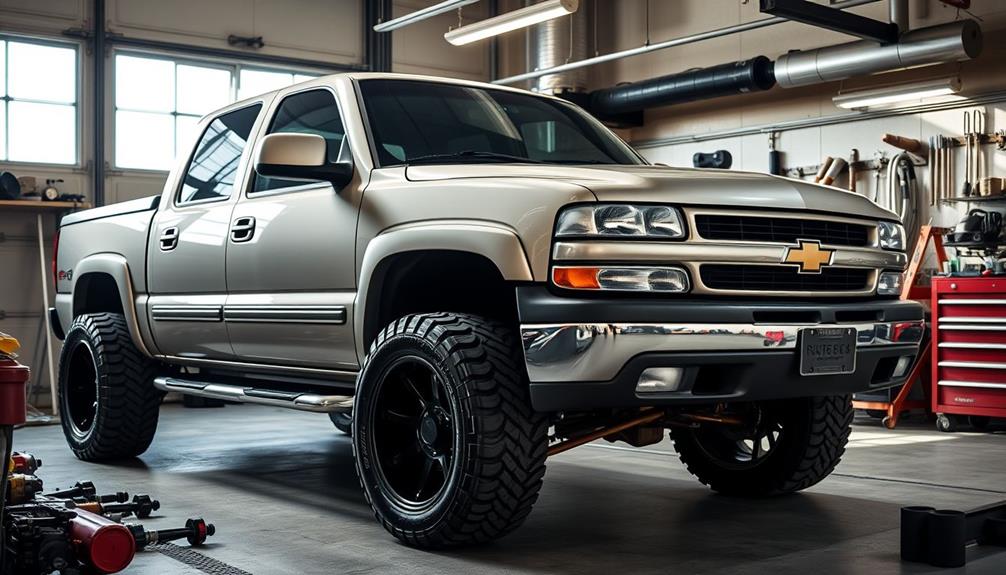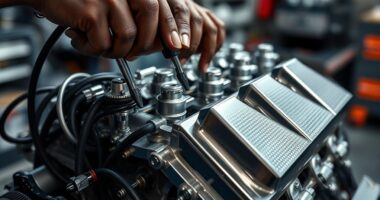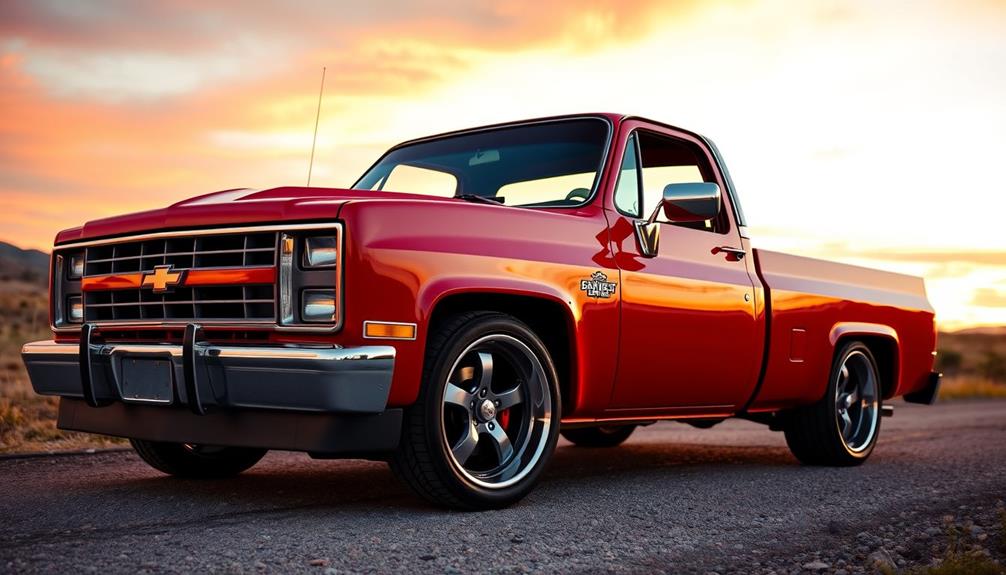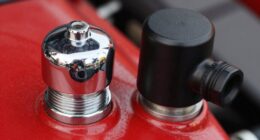Tuning your 2000 Chevrolet Silverado can greatly enhance its performance and style. Start with engine modifications like a cold air intake or dual exhaust system for better airflow and horsepower. Upgrade the suspension with a lift kit and performance shocks to improve handling. Consider larger, lightweight wheels for better traction and responsiveness. Don't forget about interior upgrades like a modern audio system and comfortable seating. Regular maintenance is key to keep everything running smoothly. For even more tips and ideas tailored to make your classic pickup stand out, you can explore additional modifications that suit your needs. Modern tuning for classic pickup trucks can also include upgrades like a performance chip to optimize fuel economy and power. Additionally, adding a roll bar and off-road lights can enhance both the safety and aesthetic appeal of your Silverado. Ultimately, the goal of modern tuning for classic pickups is to create a custom vehicle that reflects your personal style and provides superior performance on and off the road.
Key Takeaways
- Upgrade the engine with a cold air intake and dual exhaust system to boost horsepower and efficiency without extensive ECU tuning.
- Consider a camshaft upgrade and ECU tuning for improved torque and power delivery, aiming for approximately 400 HP at the crank.
- Change your gear ratio to 4.10 for better acceleration, especially if larger tires are installed for enhanced off-road performance.
- Enhance suspension with a lift kit and performance shocks to improve ride quality and off-road capability while reducing body roll.
- Modernize the interior with an upgraded audio system and custom seating for improved comfort and style in your classic pickup.
Engine Modifications
When it comes to enhancing your 2000 Chevrolet Silverado, engine modifications can make a world of difference. One of the first upgrades you should consider is installing a cold air intake. This modification increases airflow to the engine, which can lead to horsepower gains of 5 to 10 HP without needing to tune your ECU. It's a straightforward way to boost performance without considerable hassle.
Next, think about upgrading to a full dual exhaust system with high-flow catalytic converters. This change remarkably improves exhaust flow, enhancing engine efficiency and performance.
To further optimize your engine, replacing the stock heads with Patriot Heads part number 2027, milled to 59cc, can help you achieve a target compression ratio of 10:1.
Additionally, a camshaft upgrade, like the Howards Cam part number 190275-17, offers balanced performance with enhanced low-end torque and mid to top-end gains.
Lastly, while these modifications can yield impressive results, don't forget that ECU tuning is essential. It allows you to adjust fuel delivery and timing, ensuring you maximize the horsepower and torque outputs from all your upgrades.
Performance Goals

When you're tuning your 2000 Chevrolet Silverado, aiming for around 400 HP at the crank is a solid performance goal.
Consider upgrading your gear ratios from 3.73 to 4.10 to boost acceleration and overall performance.
Balancing these enhancements with everyday drivability will help you enjoy both power and practicality.
Target Horsepower Increase
Achieving a target horsepower increase of around 400 HP at the crank for your 2000 Chevrolet Silverado requires a strategic approach to engine modifications.
Start by upgrading your exhaust system to a high-flow variant, which will improve airflow and reduce back pressure. Pair this with a cold air intake to enhance engine breathing, further contributing to your target horsepower increase.
Next, consider installing Patriot Heads with part number 2027, milled to 59cc. This modification helps achieve a 10:1 compression ratio, boosting overall engine efficiency and power output.
For improved performance, you can install the Howards Cam part number 190275-17. With a duration of 216/224 and a lift of .553, this cam will considerably enhance low-end torque and mid to top-end performance.
Don't forget about ECU tuning, as it plays a vital role in maximizing your horsepower gains. Proper tuning can yield up to a 25% increase in power for modified engines.
Finally, upgrading your fuel injectors guarantees adequate fuel delivery, supporting the higher performance demands and maintaining engine reliability.
With these modifications, you'll be well on your way to achieving your target horsepower increase.
Gear Ratio Considerations
Often overlooked, gear ratio adjustments play an essential role in meeting your performance goals for the 2000 Chevrolet Silverado. When you change the gear ratio from 3.73 to 4.10, you'll notice a considerable boost in acceleration and responsiveness. This change is particularly beneficial if you've modified your engine to achieve around 400 HP at the crank.
Lowering the gear ratio improves torque delivery, making it easier to handle larger tires, especially if you're upgrading to sizes like 35 inches. A 4.10 gear ratio strikes a great balance between performance and daily drivability, allowing for better fuel efficiency during highway driving compared to lower ratios.
If you've made major performance modifications, such as engine tuning or forced induction, re-gearing your differentials is essential. This adjustment guarantees your engine operates within its ideal power band for maximum efficiency.
Lastly, always consider your intended use of the vehicle—whether it's for towing, off-road adventures, or daily driving—when evaluating gear ratio considerations. Choosing the right ratio can greatly enhance your Silverado's overall performance and enjoyment.
Suspension Enhancements
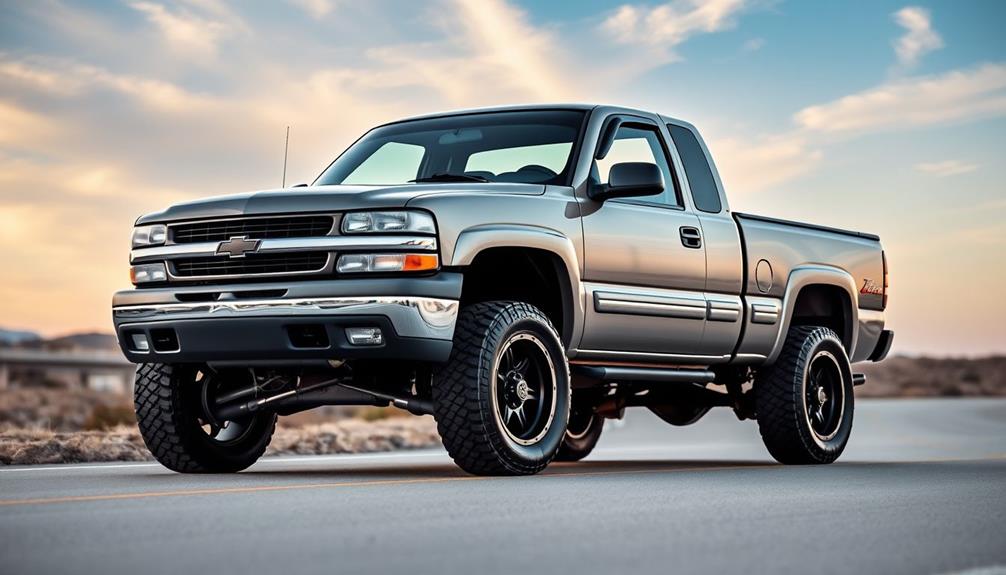
To elevate your Chevrolet Silverado 2000's performance, consider a range of suspension enhancements that can transform your driving experience. Upgrading to a quality lift kit not only boosts ground clearance but also improves off-road capability while ensuring proper CV and control arm angles. This helps prevent rapid wear on essential suspension components.
Performance shocks and struts are another great investment, as they greatly enhance ride quality and handling, giving you better control whether you're on or off the road.
Additionally, installing upgraded sway bars can reduce body roll during cornering, enhancing stability and responsiveness for a more confident drive.
If you're looking for customization, utilizing adjustable coilovers allows you to tailor your suspension setup to your specific driving needs, letting you modify ride height and damping as desired.
Lastly, don't overlook the importance of regular maintenance and inspection of your suspension components like bushings and ball joints. Keeping these parts in check is vital for peak performance and longevity of your suspension system.
Wheels and Tires
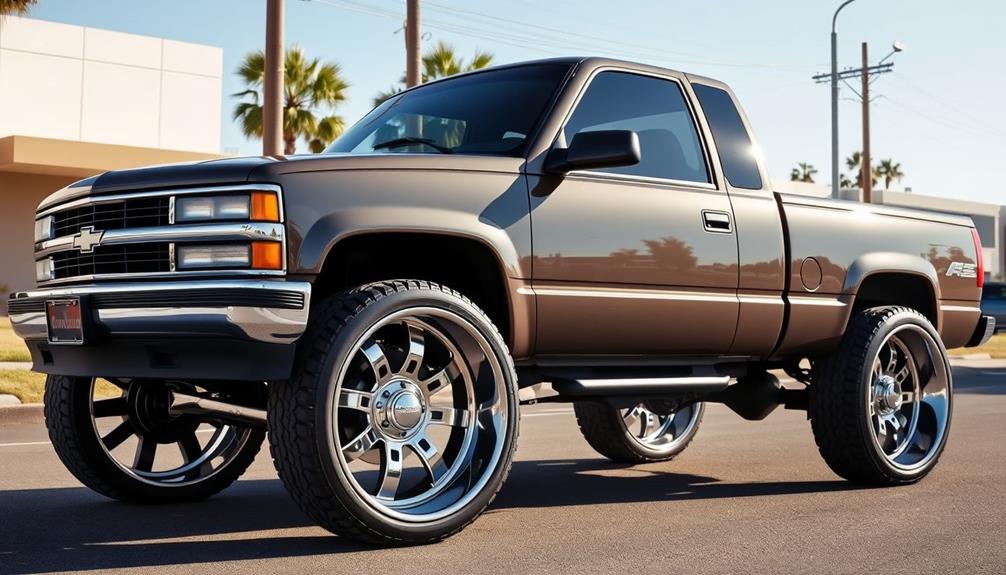
When upgrading your 2000 Chevrolet Silverado, considering the right tire size and wheel material is essential for performance.
Choosing wider tires can greatly enhance traction, while lightweight wheels reduce unsprung weight, improving acceleration.
Let's explore how these choices can elevate your driving experience.
Tire Size Considerations
Upgrading the tire size on your Chevrolet Silverado 2000 can greatly enhance its performance, but it's vital to take into account several factors.
Tire size considerations, like selecting larger tires, can affect your vehicle's power and efficiency. If you're thinking about going for 35-inch tires, you'll need to regear the differentials to maintain ideal power levels. Recommended gear ratios, such as 4.56 or 4.88, can help keep your performance intact.
When you increase tire size, you also put more load on the drivetrain, which can impact both performance and fuel efficiency if not properly matched. Regularly monitoring tire wear and alignment is important to avoid handling issues, especially after such an upgrade.
Larger tires may alter your suspension geometry, so pay attention to that. If you plan on tackling rugged terrains, opting for off-road tires can provide better grip and traction, enhancing your vehicle's capabilities.
Wheel Material Advantages
Choosing the right wheel material can greatly impact your Chevrolet Silverado 2000's performance and handling.
Lightweight wheels, such as those made from aluminum or carbon fiber, can reduce unsprung weight, leading to improved acceleration and braking performance. You'll notice enhanced responsiveness, making your driving experience more enjoyable.
Forged wheels offer significant wheel material advantages as they're stronger and more durable than cast options. Their resistance to bending and cracking makes them ideal for both performance and off-road applications.
If you often venture off the beaten path, these wheels are worth considering.
Wider wheels increase the contact patch with the road, providing better traction and stability, especially important for off-road driving.
Plus, upgrading to larger diameter wheels not only enhances your Silverado's aesthetic appeal but also allows for larger tires, boosting off-road capability.
Interior Upgrades
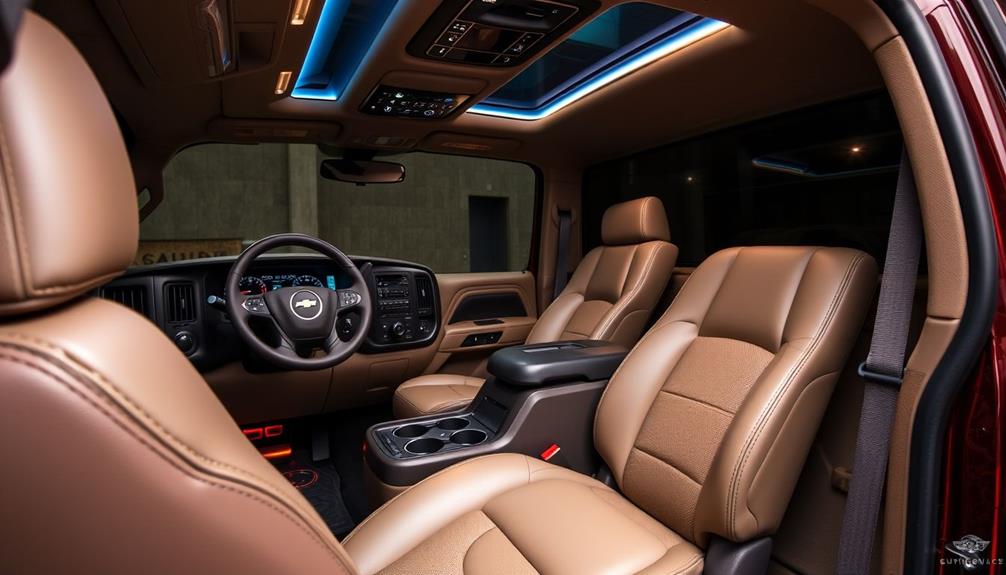
Transforming the interior of your 2000 Chevrolet Silverado can breathe new life into your driving experience. One of the best interior upgrades you can make is installing an aftermarket stereo system. This not only enhances audio quality, but many models also offer Bluetooth connectivity, allowing you to enjoy your favorite tunes wirelessly.
Custom seat covers are another fantastic upgrade, improving comfort while letting you express your personal style. Choose durable materials like neoprene or leather to elevate both aesthetics and longevity.
To modernize the dashboard, consider adding a dash kit. Options in chrome, carbon fiber, or wood grain finishes can help you achieve the look you desire.
For a cozy atmosphere, adding LED lighting upgrades throughout the cabin can greatly enhance visibility, especially during nighttime drives.
Lastly, don't skimp on quality floor mats. Investing in tailored options, whether rubber or carpet, will protect your original carpeting from wear and tear, ensuring your Silverado looks great for years to come.
All these interior upgrades work together to make your classic pickup feel fresh and inviting.
Exterior Modifications
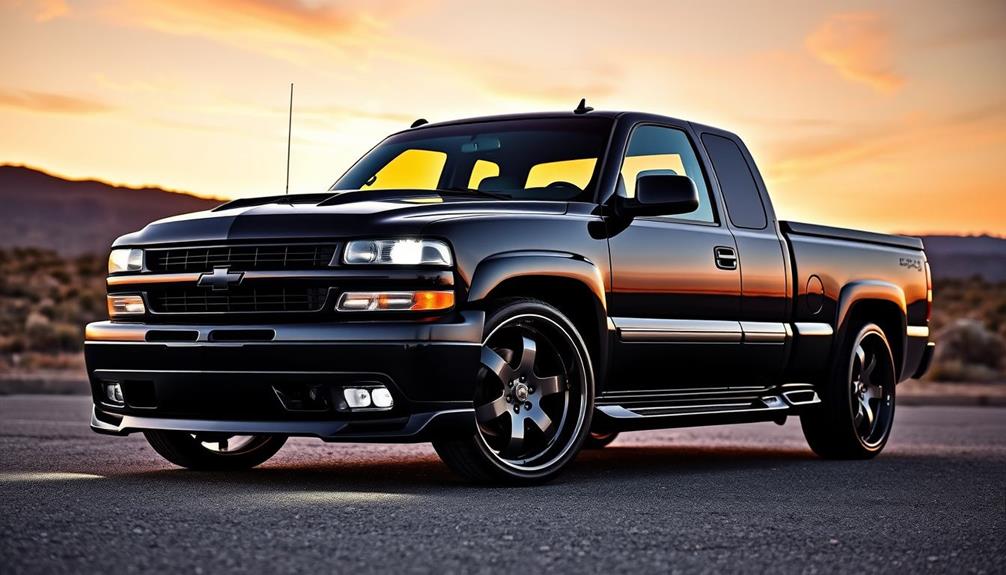
When it comes to enhancing the exterior of your 2000 Chevrolet Silverado, a few strategic modifications can make a significant impact. One standout option is upgrading to a custom grille, which can give your truck a unique look that sets it apart from stock models.
Pairing this with a sleek body kit can improve both aerodynamics and visual appeal, featuring components like front bumpers, side skirts, and rear spoilers for that sporty edge.
Don't overlook the lighting; installing LED headlight upgrades not only modernizes your truck's appearance but also boosts nighttime visibility compared to traditional halogen bulbs.
Additionally, a tonneau cover is a smart investment, improving fuel efficiency by reducing aerodynamic drag while providing secure storage for your cargo.
Maintenance Practices
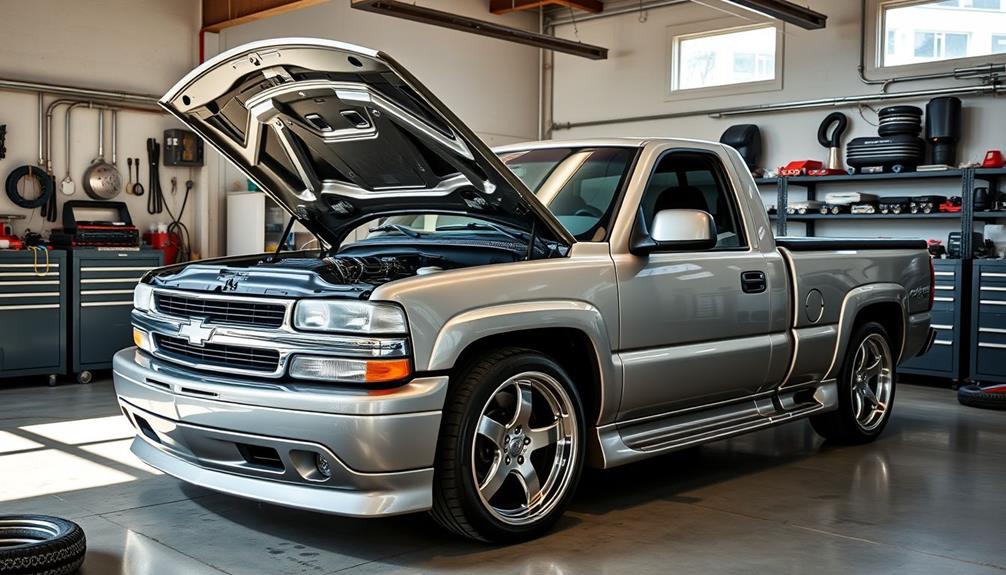
To keep your 2000 Chevrolet Silverado running smoothly and reliably, regular maintenance is vital. Start by changing your oil every 3,000 miles. This practice not only guarantees engine longevity but also prevents wear on essential components.
When you change the oil, always use high-quality oil filters to maintain proper lubrication, which is particularly important for older vehicles like yours.
In addition to oil changes, it's important to change all fluids, including brake fluid and transmission fluid, during routine maintenance practices. This helps guarantee peak performance and prevents costly repairs down the line.
Keep an eye out for potential oil leaks, especially if you've switched to synthetic oil. Older gaskets may struggle with the different properties of synthetic lubricants.
If you frequently tow or go off-roading, consider early oil changes. This extra step can greatly enhance your engine's performance and reliability.
By sticking to these maintenance practices, you'll not only prolong the life of your Silverado but also enjoy a smoother, more dependable driving experience.
Lift Kits Overview
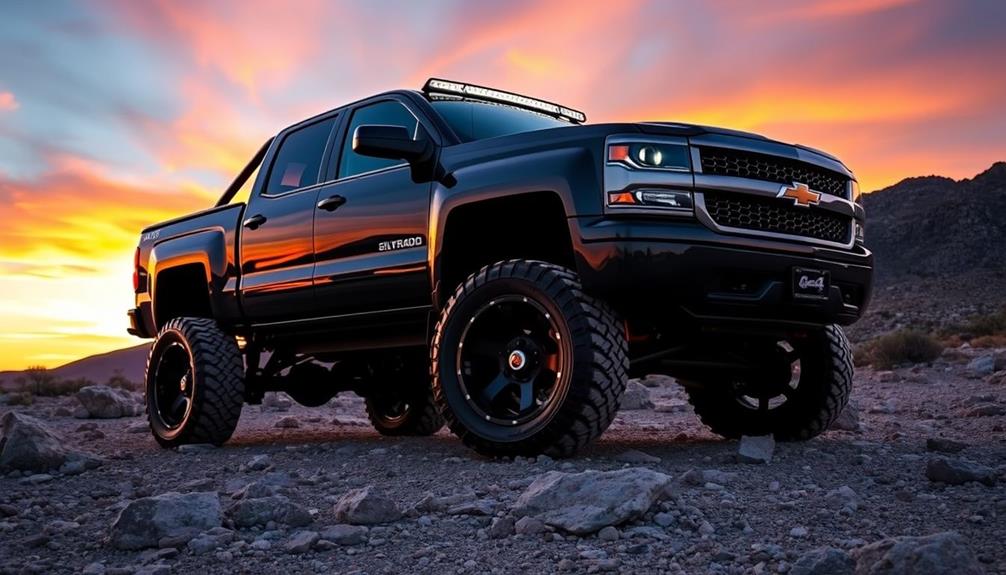
If you're looking to enhance your 2000 Chevrolet Silverado's off-road capabilities, installing a lift kit is a popular upgrade. Lift kits typically range from 2 to 6 inches, allowing you to fit larger tires and markedly improve your truck's off-road performance.
A quality lift kit increases ground clearance, enhancing approach and departure angles, which are essential for tackling rugged terrain.
When you install a lift kit, you might need to re-gear your differentials to maintain ideal power levels, especially if you opt for larger tires. Recommended gear ratios are usually around 4.56 or 4.88 for the best performance.
However, keep in mind that lift kits can also affect your vehicle's suspension geometry. Selecting a reputable brand and ensuring proper installation is critical to prevent premature wear on components.
After installation, regular maintenance checks are fundamental. You'll want to monitor any changes in suspension alignment or wear on parts due to the altered ride height.
Transmission Considerations

When tuning your 2000 Chevrolet Silverado, it's vital to take into account the transmission type you're working with, typically the 4L60E.
If you're upgrading for performance, re-gearing is essential to match your new setup and keep everything running smoothly.
Don't forget that regular fluid maintenance is key to extending the life of your transmission, especially as you push for higher power levels.
Transmission Type Selection
Selecting the right transmission type for your 2000 Chevrolet Silverado is crucial for maximizing performance and reliability. The factory-installed 4L60E automatic transmission is versatile but may struggle under higher horsepower if not properly geared. If you're pushing more than 400 horsepower, upgrading to a 4L80E transmission could be your best bet, as it offers increased strength and durability.
When making your transmission type selection, consider your Silverado's intended use. If you're heavy towing or racing, opting for a performance-oriented upgrade can greatly enhance power handling. Additionally, proper tuning of the transmission control module can optimize shift points, improving drivability after engine modifications.
Here's a quick comparison of the two transmission types:
| Transmission Type | Strength & Suitability |
|---|---|
| 4L60E | Versatile; struggles >400 HP |
| 4L80E | Strong; ideal for modified engines |
Don't forget about regular maintenance! Changing your transmission fluid and filter every 30,000 to 50,000 miles guarantees longevity and keeps your ride running smoothly.
Re-gearing for Performance
To achieve ideal performance after upgrading to larger tires on your 2000 Chevrolet Silverado, re-gearing the differential is vital.
With the stock 4L60E transmission, larger tires place extra strain on the engine, leading to sluggish acceleration and decreased fuel efficiency. By re-gearing, you can restore lost torque and enhance your truck's performance.
Consider gear ratios like 4.56 or 4.88, as they effectively compensate for the increased load from bigger tires. This adjustment helps your engine turn those heavy tires more efficiently, improving overall power delivery and driving experience.
Without re-gearing, you'll likely find that your Silverado struggles to perform, which can be frustrating.
It's also wise to evaluate your torque converter during this process. Upgrading this component can further optimize power delivery, ensuring your Silverado handles the modifications well.
Regular checks on your transmission fluid levels and condition are essential, too. Keeping an eye on these factors prevents overheating and promotes smooth operation, especially when your truck is under increased strain.
Fluid Maintenance Importance
Maintaining your transmission fluid is essential for keeping your 2000 Chevrolet Silverado running smoothly, especially after modifications like re-gearing.
Regular transmission fluid changes are vital for the health of the 4L60E transmission, with a recommended interval of every 30,000 to 50,000 miles for peak performance. This maintenance is part of the fluid maintenance importance that can't be overlooked.
Using high-quality transmission fluid that meets GM specifications will enhance shifting performance and prolong the lifespan of your transmission components.
Always monitor the fluid level and condition; burnt or discolored fluid can signal overheating or contamination that needs immediate attention.
If you've tuned your truck to handle heavier loads, consider upgrading to synthetic transmission fluid. It improves performance and temperature stability under increased stress.
Additionally, don't forget to regularly inspect and replace the transmission filter. This simple step prevents debris buildup, ensuring smooth operation and reducing the risk of transmission failure.
Community Resources
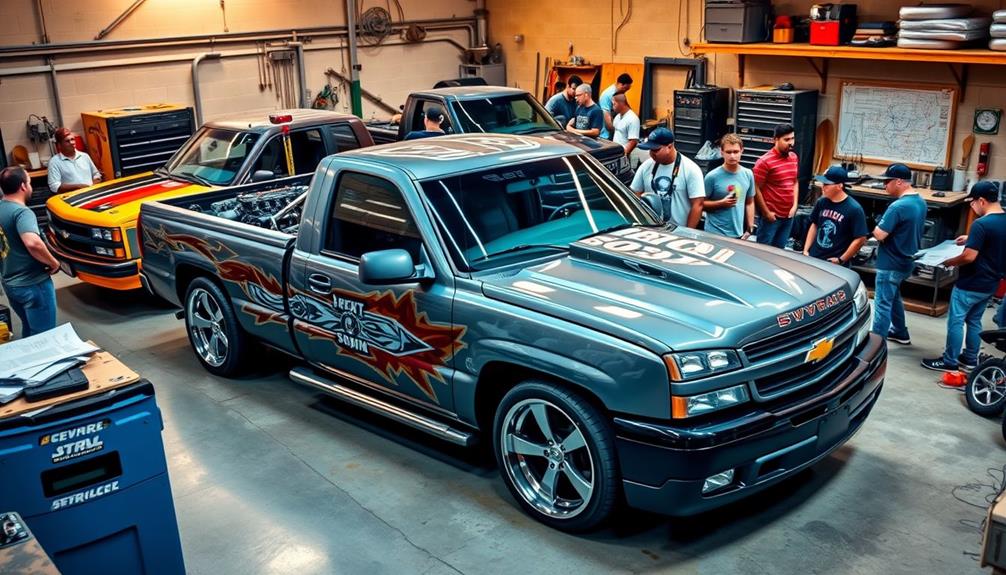
A wealth of community resources awaits Chevrolet Silverado enthusiasts keen to enhance their vehicles. By tapping into the Chevrolet & GMC truck enthusiast community, you'll find a platform rich in discussions, advice, and information on performance modifications for your 2000 Silverado. Registered users gain access to exclusive content, including technical forums and galleries showcasing various upgrades and builds.
Here's a quick look at some valuable community resources:
| Resource Type | Description |
|---|---|
| Technical Forums | Discuss tuning and modifications specific to the 2000 Silverado. |
| Event Calendar | Stay updated on events and meet-ups in your area. |
| Build Galleries | Browse through member showcases for inspiration. |
| FAQs | Get answers to common questions for new users. |
| Model-Specific Forums | Find targeted advice for your specific truck model. |
Engaging with these resources not only helps you with your tuning journey but also connects you with fellow enthusiasts who share your passion for classic pickups. So immerse yourself, explore, and make your Silverado truly yours! When tuning your Chevrolet Silverado, it’s important to have a community of like-minded individuals who can provide support and guidance along the way. These resources can offer valuable tips and tricks to help you achieve the custom look and performance you desire for your vehicle. So don’t be afraid to reach out and tap into the wealth of knowledge and experience that these communities have to offer when tuning your Chevrolet Silverado. Tuning your Chevrolet Silverado is a personal journey, and having a community behind you can make all the difference. Whether you’re looking to upgrade the engine, customize the exterior, or enhance the suspension, there’s a wealth of information available to help you achieve your goals. Tuning your Chevrolet Silverado is not just about making modifications, it’s about creating a vehicle that truly reflects your style and personality. With the support of fellow enthusiasts, you can turn your vision into a reality and take your Silverado to the next level.
Frequently Asked Questions
How Many Miles per Gallon Does a 2000 Chevy Silverado 1500 5.3 Get?
The 2000 Chevy Silverado 1500 with a 5.3L V8 generally gets 14-17 mpg in the city and 18-21 mpg on the highway. Your driving habits and maintenance can greatly impact these numbers.
How to Add Horsepower to 5.3 Silverado?
To boost horsepower in your 5.3 Silverado, consider a cold air intake and long-tube headers. Combine those with a performance camshaft, ECU tuning, and high-flow fuel injectors for impressive gains and improved performance.
How Do I Add Horsepower to My 6.2 Silverado?
To add horsepower to your 6.2 Silverado, consider installing a cold air intake, long-tube headers, and a performance camshaft. Tuning your ECU and upgrading fuel injectors will also maximize your gains effectively.
What Is the Most Powerful Silverado Engine?
You might be surprised to learn that the most powerful Silverado engine is the 8.1L Vortec V8. It churns out 340 horsepower and an impressive 455 lb-ft of torque, perfect for heavy-duty tasks.
Conclusion
In breathing new life into your 2000 Chevrolet Silverado, you've commenced a journey reminiscent of Odysseus, traversing the seas of modern modifications. By enhancing its engine, fine-tuning the suspension, and revamping the interior, you're not just restoring a classic; you're crafting a masterpiece that echoes through time. Embrace the community resources available, and remember: every upgrade is a step toward a legendary ride that'll turn heads and inspire admiration on every road you conquer.
